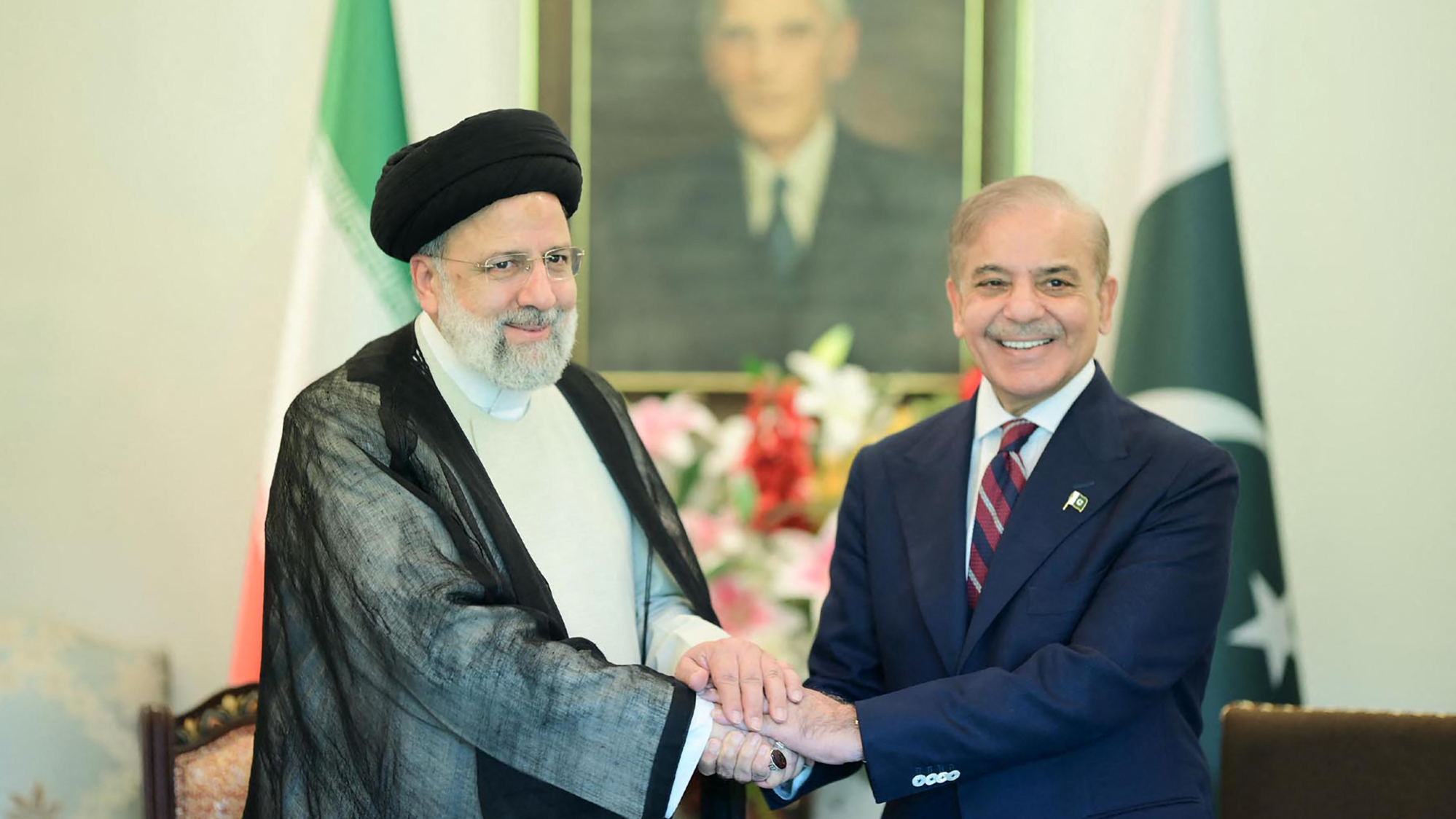
The latest visits of senior officials from Iran and Saudi Arabia show the further strengthening of bilateral relations between Pakistan and countries in the Arabian Peninsula and the wider Middle East to seek solutions to common challenges, experts say.
They added, however, that although both sides can benefit from the emerging partnerships, it would not be seen positively in Washington, which may throw up some obstacles.
Earlier on Monday, Pakistani Prime Minister Shehbaz Sharif and Raisi agreed to cooperate in developing joint approaches to confront common challenges, including the threat of terrorism, said the statement
“The ongoing Israel-Palestine war, Russia-Ukraine conflict, the US unilateral sanctions on Pak-Iran dream gas pipeline … and constant economic protectionism along with newly coined decoupling and delinking parameters encourage both sides to further strengthen their relationships,” said Mehmood Ul Hassan Khan, executive director of the Center for South Asia and International Studies in Islamabad.
READ MORE: Pakistan, Iran to form high-level mechanism for cooperation
Iranian President Ebrahim Raisi wrapped up, on April 24, a three-day visit to Pakistan, during which both sides agreed to increase the volume of bilateral trade to $10 billion in the next five years, according to a statement from the Pakistani Prime Minister's Office.
It is reported to be the first visit of a head of state to the South Asian nation after its new government took charge.
Earlier on Monday, Pakistani Prime Minister Shehbaz Sharif and Raisi agreed to cooperate in developing joint approaches to confront common challenges, including the threat of terrorism, said the statement.
“Raisi's visit has certainly accentuated bilateral relations” and “despite earlier tensions, recent engagements suggest a thaw in Iran-Pakistan relations, emblematic of Pakistan's commitment to regional harmony”, said Imran Khalid, an international affairs commentator and freelance writer based in Karachi, Pakistan.
Strengthened Iran-Pakistan ties will not only promote regional stability but also facilitate a joint counterterrorism framework, which will benefit all stakeholders, he added.
According to Takalvi, there is a strong realization among policymakers in Islamabad that close ties with regional partners – particularly in investment, commercial and energy arenas – is the need of the hour and ‘the way forward’ for the nation
Nonetheless, “Washington's subtle warnings to Pakistan regarding its growing ties with Tehran cast a shadow”, he said. “This unilateral stance underscores US interventionism, contrasting with its Middle East policies.”
Last week, Pakistani prime minister Sharif also held a phone talk with the President of the United Arab Emirates (UAE) Sheikh Mohamed bin Zayed Al Nahyan to discuss the enhancement of cooperation to counter challenges associated with climate change, according to the Pakistan prime minister's office.
Both leaders also reaffirmed their commitment to enhancing bilateral cooperation in multifaceted areas, the prime minister's office said.
A high-level Saudi delegation led by Saudi Arabia Foreign Minister Prince Faisal bin Farhan Al Saud visited Pakistan from April 15 to 16. The two sides agreed to further promote economic cooperation and convert the strong partnership into a strategic partnership for the mutual benefit of the two countries.
“Pakistan’s renewed push to strengthen economic, commercial and investment ties with the Middle Eastern nations is a continuity of Islamabad’s approach of ‘Regional Recalibration’ of its foreign policy, being pursued for the past several years,” said Irfan Shahzad Takalvi, founder of the Eurasian Century Institute in Islamabad.
According to Takalvi, there is a strong realization among policymakers in Islamabad that close ties with regional partners – particularly in investment, commercial and energy arenas – is the need of the hour and ‘the way forward’ for the nation.
“Luckily, the desire is reciprocal and countries in the Arabian Peninsula as well as the wider Middle East are expressing keen interest to join hands with Pakistan. Saudi Arabia, Iran, the UAE, Qatar and others are working with Pakistan to build mutually win-win partnerships,” Takalvi noted, adding that the same time he hopes that the days of coercion and diktat from the West can be over.
Khan, at the Center for South Asia and International Studies, added that Pakistan has been a staunch supporter of countries in the Middle East, mainly Saudi Arabia, the UAE, Qatar, Kuwait and many others for a long period of time
Pakistan has been strengthening its ties with Gulf countries like Saudi Arabia, which is very important for several reasons, said Gokhan Ereli, Gulf Studies coordinator at the Center for Middle Eastern Studies, in Turkiye.
He noted that, “on top of the economic help, there's also cooperation on security matters.” Besides, these improved relationships can “influence how Pakistan interacts with other regional players like Iran and India, helping Pakistan balance its regional diplomacy,” Ereli added.
READ MORE: China welcomes progress in restoration of Iran-Pakistan ties
Khan, at the Center for South Asia and International Studies, added that Pakistan has been a staunch supporter of countries in the Middle East, mainly Saudi Arabia, the UAE, Qatar, Kuwait and many others for a long period of time.
He said Pakistan’s economic survival has been directly linked to its workers’ remittances and foreign direct investments from the Gulf Cooperation Countries Bahrain, Kuwait, Oman, Qatar, Saudi Arabia, and the UAE.
One of the key factors in the further strengthening of bilateral relations between Pakistan and countries in the Middle East, however, is “China’s mediated diplomatic miracle of the 21st century, in terms of the resumption of socioeconomic and geopolitical realignment between the two regional heavyweights, Saudi Arabia and Iran, which provided the strategic cushion for Pakistan to play safe by matching the wish list of both the arch rivals”, Khan said.
Xinhua and Jan Yumul contributed to the story.
Contact the writer at vivienxu@chinadailyapac.com


